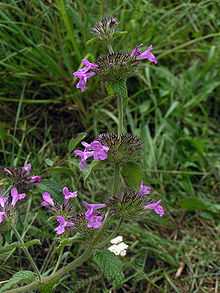Clinopodium
| Clinopodium | |
|---|---|
 | |
| Clinopodium vulgare | |
| Scientific classification | |
| Kingdom: | Plantae |
| (unranked): | Angiosperms |
| (unranked): | Eudicots |
| (unranked): | Asterids |
| Order: | Lamiales |
| Family: | Lamiaceae |
| Subfamily: | Nepetoideae |
| Tribe: | Mentheae |
| Genus: | Clinopodium L.[1] |
| Type species | |
| Clinopodium vulgare L. | |
| Species | |
|
See text. | |
Clinopodium is a genus of flowering plants in the family Lamiaceae. It is in the tribe Mentheae of the subfamily Nepetoideae, but little else can be said with certainty about its phylogenetic position.
The genus name Clinopodium is derived from the Latin clinopodion or the Greek klinopodion. These were names for Clinopodium vulgare. The Greek klino means "a bed" and the Greek podion means "a little foot". [2]
Clinopodium species are used as food plants by the larvae of some Lepidoptera species including Coleophora albitarsella.
Various Clinopodium species are used as medicinal herbs. For example C. laevigatum is used in Mexico as a tea under the name "Poleo" or "yerba de Borracho" to cure hangovers, stomach aches, and liver disease.
Taxonomy
Clinopodium has been defined very differently by different authors. Some have restricted it to as few as 13 species, all closely related to the type species, Clinopodium vulgare. In the latest revision of Lamiaceae, Clinopodium encompassed about 100 species, including those otherwise placed in the genera Acinos, Calamintha, and Xenopoma. [3] This circumscription, called Clinopodium sensu lato, was shown to be polyphyletic in 2004. [4]
Selected species
|
|
Formerly placed here
- Micromeria douglasii (Benth.) Benth. (as C. douglasii (Benth.) Kuntze)[5]
References
| Wikimedia Commons has media related to Clinopodium. |
| Wikispecies has information related to: Clinopodium |
- ↑ "Genus: Clinopodium L.". Germplasm Resources Information Network. United States Department of Agriculture. 2011-11-08. Retrieved 2012-02-22.
- ↑ Umberto Quattrocchi. 2000. CRC World Dictionary of Plant Names volume I, page 91. CRC Press: Boca Raton; New York; Washington,DC;, USA. London, UK. ISBN 978-0-8493-2673-8 (set).
- ↑ Raymond M. Harley, Sandy Atkins, Andrey L. Budantsev, Philip D. Cantino, Barry J. Conn, Renée J. Grayer, Madeline M. Harley, Rogier P.J. de Kok, Tatyana V. Krestovskaja, Ramón Morales, Alan J. Paton, and P. Olof Ryding. 2004. "Labiatae" pages 167-275. In: Klaus Kubitzki (editor) and Joachim W. Kadereit (volume editor). The Families and Genera of Vascular Plants volume VII. Springer-Verlag: Berlin; Heidelberg, Germany. ISBN 978-3-540-40593-1
- ↑ Jennifer L. Trusty, Richard G. Olmstead, David J. Bogler, Arnoldo Santos-Guerra, and Javier Francisco-Ortega. 2004. "Using Molecular Data to Test a Biogeographic Connection of the Macaronesian Genus Bystropogon (Lamiaceae) to the New World: A Case of Conflicting Phylogenies". Systematic Botany 29(3):702-715.
- ↑ 5.0 5.1 "Clinopodium". Integrated Taxonomic Information System. Retrieved 2012-02-23.
- ↑ "GRIN Species Records of Clinopodium". Germplasm Resources Information Network. United States Department of Agriculture. Retrieved 2012-02-22.